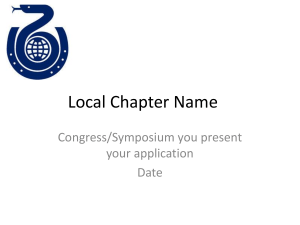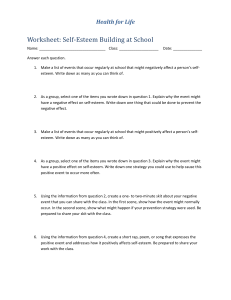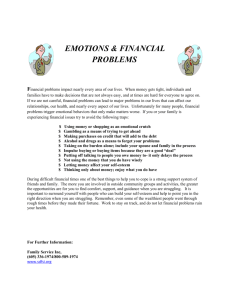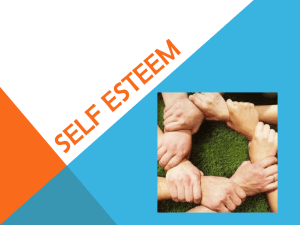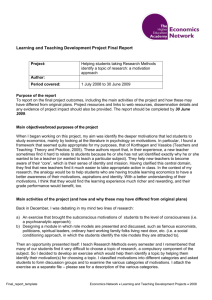Use of Criteria for Violence Assessment Chart
advertisement
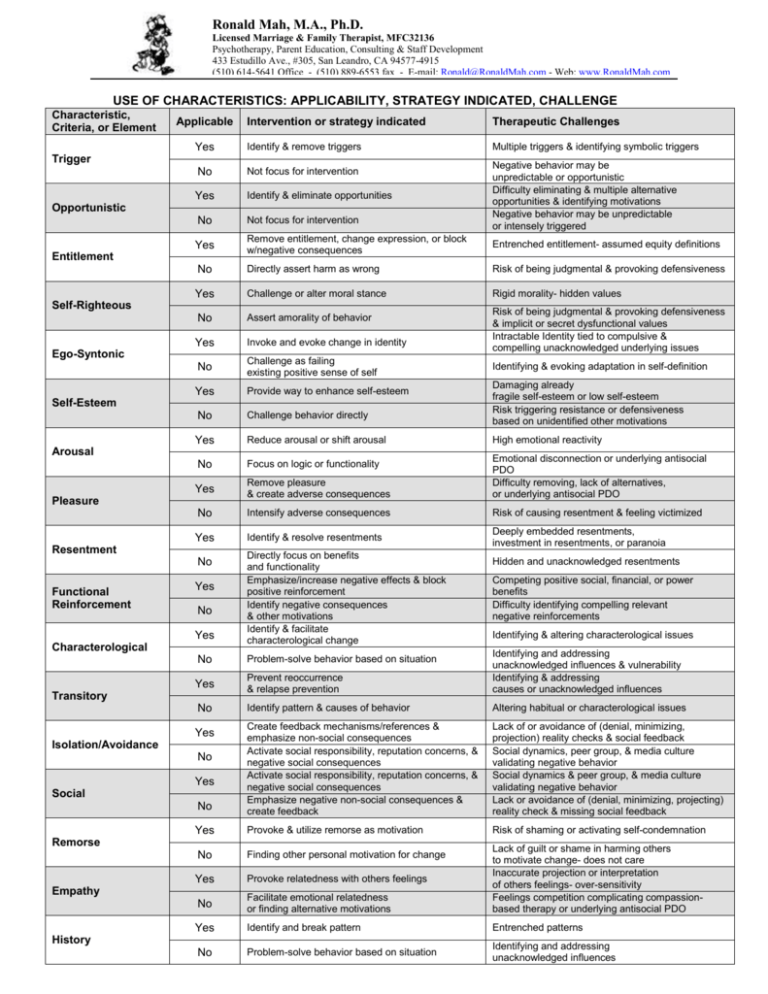
Ronald Mah, M.A., Ph.D. Licensed Marriage & Family Therapist, MFC32136 Psychotherapy, Parent Education, Consulting & Staff Development 433 Estudillo Ave., #305, San Leandro, CA 94577-4915 (510) 614-5641 Office - (510) 889-6553 fax - E-mail: Ronald@RonaldMah.com - Web: www.RonaldMah.com USE OF CHARACTERISTICS: APPLICABILITY, STRATEGY INDICATED, CHALLENGE Characteristic, Criteria, or Element Applicable Intervention or strategy indicated Therapeutic Challenges Yes Identify & remove triggers Multiple triggers & identifying symbolic triggers No Not focus for intervention Yes Identify & eliminate opportunities No Not focus for intervention Yes Remove entitlement, change expression, or block w/negative consequences Entrenched entitlement- assumed equity definitions No Directly assert harm as wrong Risk of being judgmental & provoking defensiveness Yes Challenge or alter moral stance Rigid morality- hidden values No Assert amorality of behavior Yes Invoke and evoke change in identity No Challenge as failing existing positive sense of self Yes Provide way to enhance self-esteem No Challenge behavior directly Yes Reduce arousal or shift arousal No Focus on logic or functionality Yes Remove pleasure & create adverse consequences Emotional disconnection or underlying antisocial PDO Difficulty removing, lack of alternatives, or underlying antisocial PDO No Intensify adverse consequences Risk of causing resentment & feeling victimized Yes Identify & resolve resentments Deeply embedded resentments, investment in resentments, or paranoia Trigger Opportunistic Entitlement Self-Righteous Ego-Syntonic Self-Esteem Arousal Pleasure Resentment Risk of being judgmental & provoking defensiveness & implicit or secret dysfunctional values Intractable Identity tied to compulsive & compelling unacknowledged underlying issues Identifying & evoking adaptation in self-definition Damaging already fragile self-esteem or low self-esteem Risk triggering resistance or defensiveness based on unidentified other motivations High emotional reactivity Yes Directly focus on benefits and functionality of behavior Emphasize/increase negative effects & block positive reinforcement Identify negative consequences & other motivations Identify & facilitate characterological change No Problem-solve behavior based on situation Yes Prevent reoccurrence & relapse prevention Identifying and addressing unacknowledged influences & vulnerability Identifying & addressing causes or unacknowledged influences No Identify pattern & causes of behavior Altering habitual or characterological issues No Create feedback mechanisms/references & emphasize non-social consequences Activate social responsibility, reputation concerns, & negative social consequences Activate social responsibility, reputation concerns, & negative social consequences Emphasize negative non-social consequences & create feedback Lack of or avoidance of (denial, minimizing, projection) reality checks & social feedback Social dynamics, peer group, & media culture validating negative behavior Social dynamics & peer group, & media culture validating negative behavior Lack or avoidance of (denial, minimizing, projecting) reality check & missing social feedback Yes Provoke & utilize remorse as motivation Risk of shaming or activating self-condemnation No Finding other personal motivation for change Yes Provoke relatedness with others feelings No Facilitate emotional relatedness or finding alternative motivations Lack of guilt or shame in harming others to motivate change- does not care Inaccurate projection or interpretation of others feelings- over-sensitivity Feelings competition complicating compassionbased therapy or underlying antisocial PDO Yes Identify and break pattern Entrenched patterns No Problem-solve behavior based on situation Identifying and addressing unacknowledged influences No Functional Reinforcement Negative behavior may be unpredictable or opportunistic Difficulty eliminating & multiple alternative opportunities & identifying motivations Negative behavior may be unpredictable or intensely triggered Yes No Characterological Transitory Yes Isolation/Avoidance No Yes Social Remorse Empathy History Hidden and unacknowledged resentments Competing positive social, financial, or power benefits Difficulty identifying compelling relevant negative reinforcements Identifying & altering characterological issues
